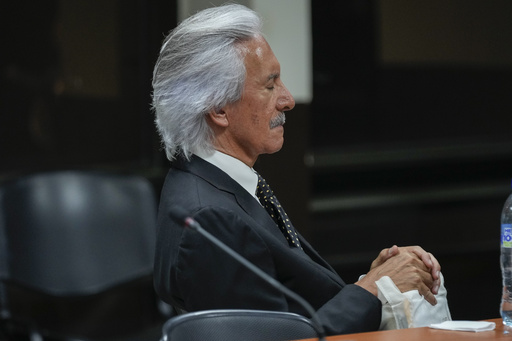
GUATEMALA CITY — After spending over two years imprisoned without a conviction, Guatemalan journalist José Rubén Zamora returned to an empty home that bore the signs of neglect, as his family had left the country, fearing they might face similar repercussions. One week post-release, he shared his uncertain outlook during an interview, expressing anxiety over the ongoing attempts to keep him incarcerated and concern for fellow journalists who engage in similar investigative pursuits.
Zamora highlighted the precarious state of journalism in Guatemala, where not just he, but also eight journalists from his founded outlet, El Periódico, have sought asylum due to threats of legal action. Those still remaining within the country grapple with a chilling fear: investigating claims could lead to imprisonment. “They can end up in jail,” Zamora noted, underscoring the risks faced by journalists in a hostile environment.
At 68 years old and suddenly thrust into the spotlight, the journalist remains reluctant to be the center of attention. He conveyed the lingering impacts of his imprisonment, which forced him to liquidate personal belongings to fund his defense while relying on his children for basic support. “Honestly, the feeling of not having any money that belongs to me is complicated,” he remarked, acknowledging his lack of means to navigate daily life.
Zamora has dedicated over thirty years to journalism, spending 24 of those as president of El Periódico, a platform created to expose corruption in Guatemala. His investigative pursuits have been met with hostility in a nation where the Attorney General’s Office has operated beyond boundaries, evidenced by raids on electoral offices to disrupt the democratic processes.
He firmly believes his newspaper’s bold investigative reports put him in the crosshairs of prosecutors, particularly noting his critiques of former President Alejandro Giammattei and Attorney General Consuelo Porras, who has faced U.S. sanctions for impeding corruption probes. In July 2022, agents from Porras’ office stormed his home and arrested him on charges of money laundering after he requested a friend to deposit $38,000, intended as a donation for the newspaper, fearing retribution against the donor.
Zamora initially received a six-year sentence, which was later overturned due to legal missteps. Subsequently, he faced accusations related to falsifying documents, which led to a second trial for alleged deceit in the first case. In late October, he was finally released, with a judge ruling that two years of pre-trial detention contravened both national and international human rights laws.
His release was significant enough to draw a visit from President Arévalo. Zamora told the President about the lack of institutional accountability in Guatemala, emphasizing the critical role of the media in a system where corruption often evades prosecution. “There are walls of impunity,” he remarked, highlighting the dire need for a functioning judicial system.
While Zamora expressed relief at reconnecting with his family, the shadows of his imprisonment loom large as uncertainty clouds his future. The abrupt downfall of El Periódico upon his arrest led to the exile of multiple colleagues, compelled to flee for reporting on judicial and prosecutorial abuses, including his own case.
With Porras still entrenched in her role, Zamora fears the possibility of facing imprisonment again. He finds himself jobless and concerned about personal interactions, aware that even casual greetings could put others at risk. “I worry about those who acknowledge me,” he shared, indicating the pervasive atmosphere of fear surrounding him.
In the garage of his home, the only remnants of his previous life consist of stacks of old copies of El Periódico, a testament to both his dedication to journalism and the harsh realities enforcing its silence.
